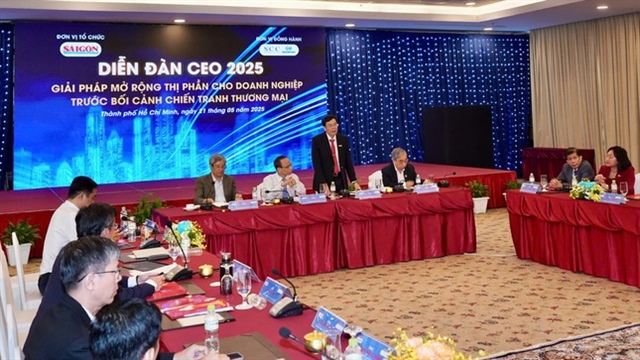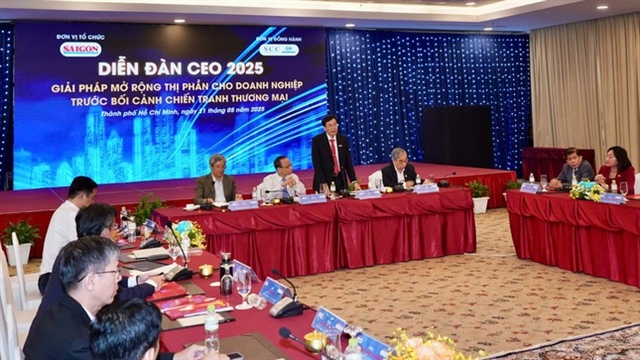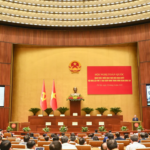The Four Pillars
Dr. Can Van Luc, a member of the Prime Minister’s Policy Advisory Council, recently spoke at the CEO Forum held in Ho Chi Minh City. He highlighted the significant pressures that Vietnamese businesses are currently facing, both domestically and internationally. The challenges they face go beyond capital, technology, markets, and digital or green transformation. They also lie in the ability to connect, utilize global value chains, and establish long-term strategic orientations.
“While Vietnam has seen the rise of several large conglomerates with international reach, the majority of businesses remain small, lacking competitive edge, and lagging in digital transformation, technological innovation, and global supply chain integration,” said Dr. Luc.
A silver lining emerges with the introduction of four pivotal resolutions by the Political Bureau: Resolution 57/2024, Resolution 59/2025, Resolution 66/2025, and Resolution 68/2025. These resolutions are deemed the “four pillars” that shape Vietnam’s vision and development path in this new era.

Forum Overview. |
According to Dr. Can Van Luc, these resolutions are not merely directives but strategic compasses. They showcase the Party’s far-sighted vision and strong determination to forge a dynamic, integrated, and sustainable economy.
For instance, Resolution 68, which focuses on private sector development, emphasizes the view that the private sector is the most important driving force of the national economy. It aims to create a conducive business environment that is transparent, stable, safe, easy to implement, and compliant with international standards, ensuring regional and global competitiveness. This resolution aims to shift the perception of businessmen as “merchants” to that of “warriors” on the business front, according to Mr. Luc.
Mr. Nguyen Ngoc Hoa, Chairman of the Ho Chi Minh City Business Association, pointed out that businesses’ resilience is being eroded. There has been a growing wave of companies exiting the market from 2022-2024, and in the first four months of this year, the number has almost equaled that of 2024. This is not just a short-term phenomenon but a continuous trend.
“While market selection is a natural part of the business cycle, the sheer number of withdrawals in the hundreds of thousands indicates a struggle for survival in the market,” Mr. Hoa observed.
Boosting Domestic Market Exploitation
Mr. Bui Ta Hoang Vu, Director of the Ho Chi Minh City Department of Industry and Trade, emphasized the need to leverage the advantages of the domestic market. With a population of 100 million and growing purchasing power, Vietnam presents a significant market opportunity. Over the past few years, this strategy has been implemented strategically and systematically, with many Ho Chi Minh City-based businesses supplying products to the domestic market and capturing a substantial market share.

Resolution 68 by the Central Committee contributes to the breakthrough of the private sector. |
“We must also enhance endogenous capacity with the ‘quadruple’ resolutions as the foundation for the private sector, businesses, and science and technology,” said Mr. Vu. He emphasized the importance of promoting linkages and regional raw material and market connections. With the upcoming merger of Ho Chi Minh City with Binh Duong and Ba Ria-Vung Tau, businesses will have expanded development space.
From a research perspective, Mr. Pham Binh An, Vice President of the Ho Chi Minh City Development Research Institute, suggested that businesses need support in the form of preferential credit, domestic consumption stimulus, tax refunds, infrastructure upgrades, and, most importantly, red tape reduction. Businesses should also proactively reposition themselves in the market and classify exports into regions such as high-protection markets (the US, EU), potential markets (India, the Middle East, Africa), or niche markets with small volumes but high added value.
Uyen Phuong
– 05:37 23/05/2025
“Empowering Vietnamese Enterprises: Marching Alongside the Nation’s Private Sector Development”
Aiming for the Government’s targeted GDP growth rate of 8%, Resolution No. 68-NQ/TW positions the private sector as the central driving force of the economy. Masan (HoSE: MSN) is expected to be one of the exemplary consumer-retail businesses, actualizing this orientation through its strategy of developing domestic value chains.
“The Address by General Secretary To Lam at the National Conference to Propagate and Implement the Resolutions of the Politburo”
“VnEconomy is honored to present the full text of General Secretary To Lam’s speech at the national conference to propagate and implement Resolution 66-NQ/TW and Resolution 68-NQ/TW of the Politburo. These pivotal resolutions are set to chart a new course for Vietnam’s future, and General Secretary To Lam’s insights offer a profound understanding of their significance.”




















